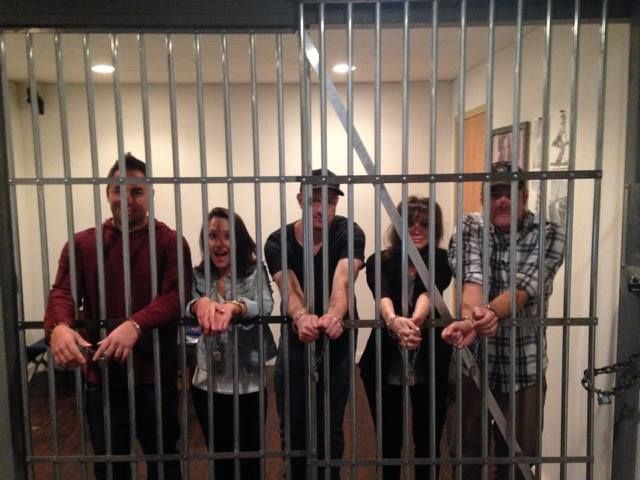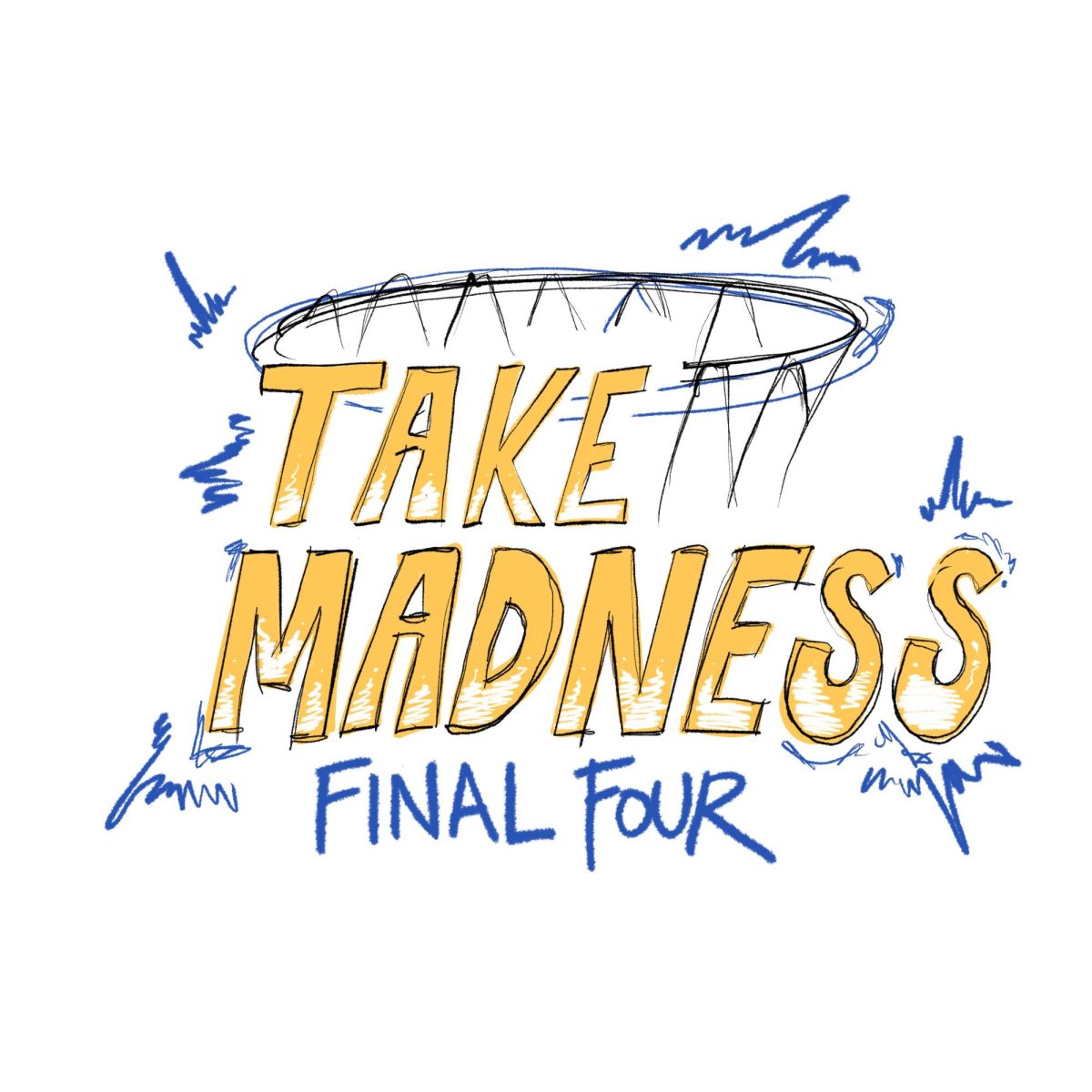Students opt for lockup in Escape Room Pittsburgh
January 5, 2015
First, Joe Deasy locked us in a jail cell.
It was a small cell set inside a larger room that had a metal desk and an electric chair. The cell was only big enough for one convict, but there were four of us locked inside. Then, Joe told us to place our hands through the bars so he could handcuff us. We did. He cuffed our hands, hung the keys on a hook just outside of the cell and locked the door of the outer room behind him, trapping us, our blood thick with excitement.
Joe, our jailer, is co-owner of Escape Room Pittsburgh in Greenfield. He locked us up in what he calls an “escape room.” To him, it’s a game.
The four of us glanced at one another and exchanged looks that were both nervous and ecstatic. Then we got to work.
The concept is simple. Joe locks his patrons in one of the two rooms of Escape Room Pittsburgh, either the Prison Escape room or Dr. Stein’s Laboratory, and gives them one hour to solve their way to freedom.
Last month, Joe offered The Pitt News the opportunity to get locked up in the Prison Escape room. Ben Wahlberg, Carlisle Walker and Connor Medgaus, all seniors at Pitt, were also locked up and contributed to our attempt. Joe asked that the answers to the puzzles not be disclosed, and The Pitt News has chosen to comply with his request. Erring towards vagueness, then, our basic process was simple: get out of the handcuffs, escape the jail cell, then figure out the code to unlock the main door. In short, the final code stumped us, and we failed to escape in the hour allotted.
“Don’t feel bad,” he said. He added that only about 30 percent of people escape. We did feel bad, though, because we had done so well until the door code puzzle; it had only taken us 15 minutes to unlock our handcuffs and get out of the jail cell.
Though the Escape Room hasn’t officially opened and is still in test mode, Joe and his co-founder and cousin, Corey Deasy, have been accepting bookings for the past few weeks.
“Technically,” Joe said, “we’re still in test group mode.”
Even still, the Deasy cousins are on the bleeding edge of attraction and live entertainment in the United States. Joe got the idea for an escape room when he was in Budapest visiting family in 2012, not long after he had graduated from Duquesne University. He saw his first escape room there and fell in love with the concept, he said.
After he returned to the United States, he called Corey and pitched the idea of opening their own escape room.
“I called my business partner — my cousin Corey — and said, ‘We’ve got to open one up, I think we’re on to something,’” Joe said.
Corey, too, saw the possibilities of an escape room.
“[It seemed like] this could be the next big thing,” he said. “I’ve always been interested in the next cool thing to do.”
The Deasys’ escape room is located at 569 Greenfield Ave., on the opposite side of Schenley Park from Oakland. Both Deasys grew up nearby in the Greenfield neighborhood.. Corey, who graduated from California University of Pennsylvania in 2012, currently designs political advertisements for Comcast Spotlight. In his free time over the last eight months, he and Joe built the escape room from scratch. Though the Deasy family already owned the storefront, their project has still incurred a significant enough investment. Neither Joe nor Corey felt comfortable quoting a figure on the escape room installation costs.
According to Tripadvisor.com, there are only 88 escape rooms in the world — most of them in Europe and China. The idea for escape rooms originated in Japan in 2007 — Takao Kato opened the first one, according to a CNBC article published in June. By 2012, the idea had spread across China to the United States. Escape Room Pittsburgh is only one of two such attractions in the state. The other escape room is in Philadelphia.
Most escape rooms are similar, Joe said, though the themes of each room can vary.
“[The escape room in Budapest] was kinda spooky,” Joe said. “It was a similar concept, you had 60 minutes to escape.”
He said that room in Budapest was his inspiration.
“We took some ideas from that, then totally spun them in our own direction,” he said. “We did everything from scratch. There are no blueprints for how to do this stuff. We completely prototyped everything and made it all ourselves.”
This aggressive do-it-yourself-ness peaked when the Deasys had to design unique themes for their rooms. To do this, Joe said, he started with the specific props, like the electric chair in the jail cell, that he wanted in each room.
“It’s a lot like working backwards,” he said.
The jail cell room is based off of the true story of Jack and Ed Biddle. In 1901, the story goes, the two brothers — rumored members of the Chloroform Gang — were arrested for robbery and murder, and they were sentenced to death by hanging. According to the Heinz History Center, while locked up in the Allegheny County prison, waiting to die, the brothers were visited by the warden’s wife, Kate Dietrich Soffel. While ministering to them, Soffel became enamored with Ed Biddle and started smuggling in tools the brothers could use to escape. On Jan. 30, 1902, in one last flourish of life, the Biddles, along with Soffel, escaped the prison. In the Deasys’ escape room, players take the Biddles’ place — except for their fatal shootout with police three days after their escape and Soffel’s consequent arrest and sentencing.
“We wanted to give each game a storyline,” Corey said. “It felt right to me, to give it a Pittsburgh feel.”
The genius of the Escape Room, though, is its lack of traditional marketing. For example, Bradley Fest, a visiting lecturer at Pitt, heard about the Escape Room through the grapevine. He and a group of seven others later visited and escaped Dr. Stein’s lab with time to spare.
“I heard about The Escape Room from a relatively new friend who recently moved to town and is pretty nerdy and very into games, and he heard about The Escape Room from someone at his job,” Fest said.
Through word of mouth and social media like Twitter, news of the Escape Room is spreading quickly. Already, the Escape Room is receiving bookings up to two months in advance, and sales are better than expected, Corey said.
“The way this business is designed, it’s like something to talk about.” Joe said. Then, addressing our group directly, “Like, you guys are going to talk about this for the next couple days.”
“Duh!” Wahlberg, a psychology major, said.
Medgaus agreed that the Escape Room was good fodder for word of mouth advertising.“It’s got really good word of mouth,” he said.
“So that’s just it,” Joe said. “It’s viral. We’re going to ride this as long as we can.”



